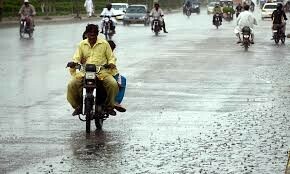council; four suspects arrested
NAJAF, Aug 30: US forces and Iraqi police on Saturday detained four people in connection with the car bomb attack that killed Ayatollah Baqer al Hakim and scores of his followers in Najaf the previous day.
Two of the four were Iraqis belonging to the Baath Party and two were Saudis, a spokesman for the Supreme Council of the Islamic Revolution in Iraq (SCIRI) said. “The four men arrested belong to Al Qaeda. Two of them are Iraqi nationals and two others are Saudis,” he said. The CNN in its report claimed that two of those arrested bore Pakistani passports.
As a mark of protest, a senior member of the Iraqi governing council Ayatollah Mohammad Bahar al Uloom quit from the council membership saying the United States had failed to bring law and order to the country.
In Najaf, tens of thousands of people thronged the shrine of Hazrat Ali on Saturday to mourn those killed by the bombing, the most deadly act of violence in post-war Iraq and one that underscored the huge task US-led forces face in trying to pacify the country.
Hospital officials said the death toll from the blast was at least 95. According to CNN, the toll had risen to 125.
In Baghdad, thousands of Shias marched through the city centre to lament the death of Ayatollah Hakim. They called on the occupying forces to end widespread lawlessness.
Analysts say Washington and its allies will be unable to make a success of the occupation if the Shias become openly hostile towards them, descend into bloody internal feuds or come into serious conflict with the Sunnis.
Immediately after Friday’s bombing, local people turned over to US troops two people they believed looked like outsiders, Lt Col Chris Woodbridge said.
The two had indicated they were from Basra and had been visiting the grave of a relative, he said.
“They are now being held by the coalition and have undergone questioning,” Colonel Woodbridge said.
Iraqi police had also detained one suspect who would be handed over to US forces for questioning, he added.
Adel Abdul Mehdi, a senior official in the Supreme Council for the Islamic Revolution in Iraq (SCIRI), said Ayatollah Hakim had asked for more security two days before he died, but would not say whether the request was made to US forces, Iraqi police or another group.
“He was concerned about his security,” Adel Mehdi said at a news conference in Baghdad. “He wasn’t afraid of dying but we had a plan for security. We wanted to adopt this plan.”
NATIONAL MOURNING: Iraq’s US-appointed Governing Council, which includes Ayatollah Hakim’s brother, declared three days of national mourning.
In Najaf, weeping relatives gathered to collect the bodies of loved ones from the mortuary and carried coffins wrapped in black shrouds with verses from the Holy Quran through the streets.
“This is the greatest crime ever against the Muslims in this holiest place,” said Sheikh Ali Jabbar, an imam at a mosque.
Women dressed in black from head to toe slapped their heads in grief. Some people reached out and touched the wreckage of cars hit by the blast as they passed by.
Fragments of metal and glass embedded in the mosque’s intricate mosaics bore witness to the blast. Thousands of shoes lay around the mosque, left behind by worshippers at Friday prayers and scattered in all directions by the bomb.
Medical officials said they had not yet been able to identify the ayatollah’s remains, likely to have been extremely badly damaged.
One religious leader said his funeral would begin in Baghdad on Sunday morning and later move on to Najaf.
Iraq’s US-led occupiers have been struggling since the official end of major combat against daily guerilla attacks which have killed 65 US and 11 British soldiers. But they now have to deal with much larger-scale violence.
The United Nations headquarters in Baghdad and the Jordanian embassy were both hit by major bomb attacks earlier this month, killing scores of people, including the chief UN envoy to Iraq, Sergio Vieira de Mello.
UN officials held a memorial service on Saturday for their slain colleagues at their bomb-damaged compound.
‘CONFESSION’: Najaf Governor Haidar Mehdi Matar claimed that the four detained in connection with the Najaf bombing had confessed to involvement in a plot to carry out the bomb blast.
Mr Matar said the four were apprehended by a crowd minutes after the blast. “People in the street thought they looked bizarre, captured them and handed them to police,” the governor said.
The attackers communicated by mobile phone in the minutes before they detonated two cars packed with explosives.
“The explosion occurred when a minibus and another car were detonated by remote control. The vehicles were packed with a total of 700 kilograms of dynamite, mortars and hand grenades,” Mr Matar said.
The blast ripped through the area at the very moment Ayatollah Hakim, considered a stabilizing influence in Iraq, left the mosque compound after delivering his Friday sermon to a sea of faithful.
SCIRI’s London representative said the arrests lent credibility to suspicions of an alliance between the Al Qaeda and veterans of Saddam Hussein’s government.
“I suspect there was a collaboration here between Al Qaeda and Saddam’s people, as well as in the blasts at the UN headquarters and Jordan embassy (in Baghdad),” said Hamed al Bayati.
Referring to the three devastating attacks in a short span of three weeks, Mr Bayati said: “They are using new tactics — car bombings, suicide bombings that have the fingerprints of Al Qaeda.
“But Al Qaeda cannot act alone in Iraq. They must have help from inside. That would be Saddam’s loyalists.”—Agencies















































Dear visitor, the comments section is undergoing an overhaul and will return soon.